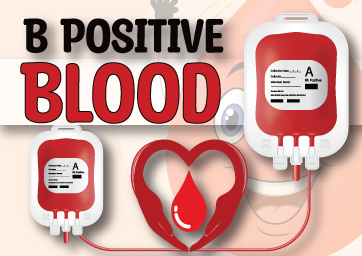
Availability: Being the third most common blood type, B+ positive blood can easily be available in case of emergency with bold transfusion need. Also, a person with B-positive blood can accept B-negative blood.
Acceptability: B-positive blood type people have antigens B and Rh in their blood. Therefore, they can accept B+, B-, O+, and O- blood type. This means that B+ positive blood is one of the most compatible blood groups in terms of receiving blood.
Donation: An individual with a B-positive blood group can donate blood to persons with blood groups B-positive and AB-positive. This means the B-positive blood group is suitable for donating blood to two different types.
Immunity: B-positive blood group people are said to have a strong immune system and a stable nervous system. They are considered more resistant to digestive diseases because they can easily adapt to the changes in their diet. Other than this, healthy individuals are believed to have fewer risks of getting diseases compared to other blood group types of people.
Personality: If the personality of the B-positive blood group individuals is considered, they are said to be more focused on listening, reflecting, and interpreting. Other than this, they are believed to be more creative, subjective, idealistic, flexible, and people-oriented beings.
What Challenges B-positive Blood Type Individuals Face?
Blood group B+ has several disadvantages which are the following.
1. Limitation as a donor: B+ blood group people can donate blood only to people with blood groups B and AB, which is a restriction as a blood donor.
2. Limitation as a recipient: People with blood group B+ can only receive blood from blood groups B and O; as a recipient of blood, it is a restriction with the B+ blood group people.
3. Behavioural Aspects: People with a B-positive blood group are usually considered to have a strong drive and focus on their work. But they are highly prone to get frustrated if things don’t go as they want. Also, it is also said about them that they can’t handle multiple tasks at a time as they are considered poor at multitasking.
4. Diet Restriction: According to the research conducted on blood groups, persons with B-positive blood should avoid having wheat, corn, peanuts, lentils, sesame seeds, and tomatoes. These foods are considered to hurt B-positive blood group individuals’ metabolism. Also, they can experience hypoglycemia, fluid retention as well as fatigue. If the chicken consumption of such individuals is considered, they should reduce chicken intake as certain elements present in the chicken can cause harm to the bloodstream and induce health disorders.
5. Drink Restriction: The most common and advised drink restriction for the B-positive blood group is not to take carbonated beverages, including soda and soft drinks.



 Contact Us
Contact Us







 Hospitals
Hospitals
 Doctors
Doctors
 Diagnostic
Diagnostic
 Pharmacy
Pharmacy
 Health Tips
Health Tips
 Blog
Blog


























Comments